Previously, Balladeer’s Blog examined star vehicles and genre films from the age of Silent Movies. This time around I’m taking a very brief look at Alfred Hitchcock’s pre-sound films.
 NUMBER THIRTEEN (1922) – This film marked the first time that Hitchcock worked as a director on a movie, but was the thirteenth film project he had worked on in some capacity, hence the title. The production went unfinished from lack of funds and the original title may have been Mrs. Peabody but even that is uncertain.
NUMBER THIRTEEN (1922) – This film marked the first time that Hitchcock worked as a director on a movie, but was the thirteenth film project he had worked on in some capacity, hence the title. The production went unfinished from lack of funds and the original title may have been Mrs. Peabody but even that is uncertain.
The movie was intended as a comedic (?) look at the Peabody Trust, an organization founded by American philanthropist George Foster Peabody to provide affordable housing to needy Londoners. Hey, I’m laughing already! (I’m kidding!) Only two reels of footage were completed and Alfred Hitchcock himself dismissed the aborted film project as insignificant. Clare Greet and Ernest Thesiger starred.
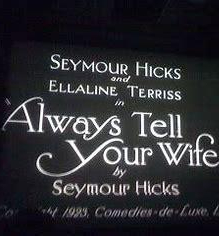 ALWAYS TELL YOUR WIFE (1923) – Hitchcock started out as a co-director of this 20-minute comedy short but had to step into the top spot when the original director quit over creative differences with the studio. Though Alfred’s previous directing effort had gone unfinished, this comedy short was completed but he was not credited since he had not directed the entire film.
ALWAYS TELL YOUR WIFE (1923) – Hitchcock started out as a co-director of this 20-minute comedy short but had to step into the top spot when the original director quit over creative differences with the studio. Though Alfred’s previous directing effort had gone unfinished, this comedy short was completed but he was not credited since he had not directed the entire film.
The storyline involved Ricardo and Mertz-style wackiness between two families, but with the more adult theme of infidelity.
 THE PLEASURE GARDEN (1925) – The third time was almost the charm as this 75-minute movie was not only completed, but Hitchcock was credited as the director!
THE PLEASURE GARDEN (1925) – The third time was almost the charm as this 75-minute movie was not only completed, but Hitchcock was credited as the director!
His bad luck lingered, however, and after one public showing, the movie was shelved and not released again until after Alfred’s film The Lodger became a hit a few years later.
The title establishment was a music hall, where chorus girl Patsy Brand gets the struggling Jill Cheyne a job as a dancer (Showgirls 1925!) and fixes her up with her fiancé’s friend.
Intrigues and murder result, with remorse tormenting the guilty.
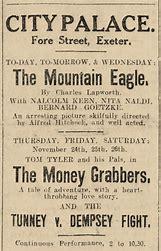 THE MOUNTAIN EAGLE (1926) – A 56-minute drama set in America’s Kentucky Hills. Pettigrew, a resentful and bitter store keeper, tries to court the local school teacher Beatrice (THE Nita Naldi) but she rejects him. As revenge, Pettigrew falsely accuses her of molesting his mentally challenged son Edward.
THE MOUNTAIN EAGLE (1926) – A 56-minute drama set in America’s Kentucky Hills. Pettigrew, a resentful and bitter store keeper, tries to court the local school teacher Beatrice (THE Nita Naldi) but she rejects him. As revenge, Pettigrew falsely accuses her of molesting his mentally challenged son Edward.
Fleeing public scorn and hostility, Beatrice marries the eccentric hermit John “Fear o’ God” Fulton and as time rolls along, finds herself genuinely falling in love with the man despite his strangeness. Out of spite, Pettigrew hides away his son Edward, then accuses Fulton of murdering him. This is one of the many, many silent films to be lost.
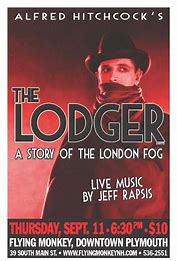 THE LODGER: A STORY OF THE LONDON FOG (1927) – This landmark movie was Alfred Hitchock’s first hit and started him well and truly on the path to becoming the Master of Suspense. It also marked the very first time he made a cameo appearance in one of his own films.
THE LODGER: A STORY OF THE LONDON FOG (1927) – This landmark movie was Alfred Hitchock’s first hit and started him well and truly on the path to becoming the Master of Suspense. It also marked the very first time he made a cameo appearance in one of his own films.
In a London gripped by terror over a serial killer called the Avenger, who is slaying blonde women, a mysterious man becomes a lodger with Mr. and Mrs. Bunting. He and their blonde daughter Daisy hit it off, much to the displeasure of her boyfriend Joe Betts, a detective investigating the Avenger killings.
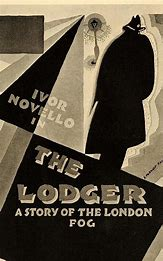 Joe, who has sworn to put a ring on Daisy’s finger as soon as he sends the serial killer at large to the gallows, becomes jealous of the enigmatic lodger and begins to suspect him of the ongoing murders.
Joe, who has sworn to put a ring on Daisy’s finger as soon as he sends the serial killer at large to the gallows, becomes jealous of the enigmatic lodger and begins to suspect him of the ongoing murders.
If you’re looking for yet another downside to one of Hitchcock’s early efforts, ponder this – everyone involved in this film is dead now! Must be some sort of curse or something. I know, right? I’ve got goosebumps right now!
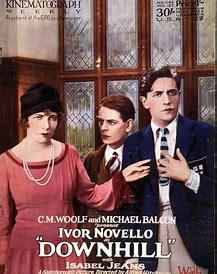 DOWNHILL (1927) – Also known as When Boys Leave Home, this production once again starred Ivor Novello in an Alfred Hitchcock joint, this one based on a play written by Novello. Ivor played Roddy Berwick, a star rugby player at his boarding school.
DOWNHILL (1927) – Also known as When Boys Leave Home, this production once again starred Ivor Novello in an Alfred Hitchcock joint, this one based on a play written by Novello. Ivor played Roddy Berwick, a star rugby player at his boarding school.
When Roddy’s roommate Tim Wakely impregnates a local goodtime girl named Mabel, she claims Roddy is really the father, because Roddy’s father is rich and she hopes a forced marriage will result. Tim admits to Berwick that he is the real father and begs Roddy not to tell, because it would result in Tim’s expulsion and his family is very poor so he lacks the resources that Roddy has to cushion his fall.
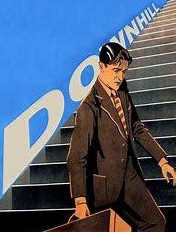 Roddy agrees to accept blame for the incident and is expelled, but to his surprise, his uptight father believes he is guilty and throws him out without a penny. The young man’s life goes from tragedy to tragedy until he winds up as a gigolo in France and feels near madness.
Roddy agrees to accept blame for the incident and is expelled, but to his surprise, his uptight father believes he is guilty and throws him out without a penny. The young man’s life goes from tragedy to tragedy until he winds up as a gigolo in France and feels near madness.
A happy ending actually results, which may be surprising to fans of Alfred’s later work.
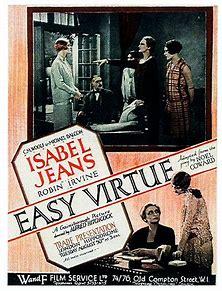 EASY VIRTUE (1927) – It’s hard not to laugh at the outdated attitudes in Easy Virtue. Our heroine, Larita Filton, becomes a pariah after being named as “the other woman” in a divorce. To escape the public shame, she moves to France and starts a new life.
EASY VIRTUE (1927) – It’s hard not to laugh at the outdated attitudes in Easy Virtue. Our heroine, Larita Filton, becomes a pariah after being named as “the other woman” in a divorce. To escape the public shame, she moves to France and starts a new life.
Eventually, she meets, falls in love with and marries a successful traveling Englishman named John Whittaker. The couple settle in England, where John’s “respectable” family learn about Larita’s scandalous (LMAO) past and it all seems to be crumbling around the long-suffering lady.
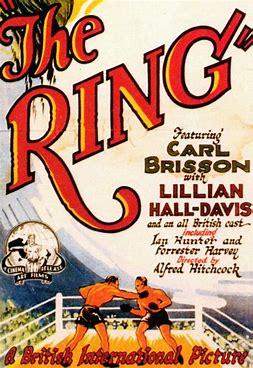 THE RING (1927) – Two boxers – Jack Saunders and Bob Corby – vie for the affections of Mabel, who ultimately marries Jack despite her attraction to the more successful Bob. Mabel conducts a side affair with Bob while Jack – jealous over his suspicions regarding the pair – grows obsessed with earning a match against Bob Corby for Bob’s heavyweight title.
THE RING (1927) – Two boxers – Jack Saunders and Bob Corby – vie for the affections of Mabel, who ultimately marries Jack despite her attraction to the more successful Bob. Mabel conducts a side affair with Bob while Jack – jealous over his suspicions regarding the pair – grows obsessed with earning a match against Bob Corby for Bob’s heavyweight title.
At last, Jack fights his way up the boxing food-chain and gets his shot at the championship. He and Bob square off in a title match as Mabel – among the spectators – tries to decide which man she really loves.
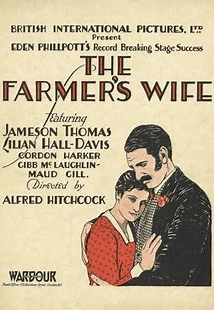 THE FARMER’S WIFE (1928) – A comedy without bloodshed is what we get here. When Farmer Sweetland’s daughter marries and leaves the nest, the aging widower acts on his late wife’s dying wish that he look for a new wife.
THE FARMER’S WIFE (1928) – A comedy without bloodshed is what we get here. When Farmer Sweetland’s daughter marries and leaves the nest, the aging widower acts on his late wife’s dying wish that he look for a new wife.
Sweetland recruits his maid Minta (short for Araminta) to help him find a suitable wife, so she lines up a series of comedically ill-suited women. We viewers suffer through the runtime as we wait for the obvious resolution of the story – Sweetland and Minta marry.
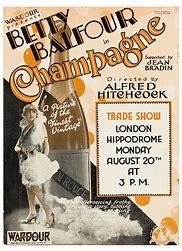 CHAMPAGNE (1928) – In the 1970s, Alfred Hitchcock pointed to this comedy as his least favorite work. Critics still praise it for the Master’s directorial skill, however. The story involves a champagne magnate whose partying daughter is a handful. Her wild nature changes when Daddy has to inform her that he has lost the family fortune.
CHAMPAGNE (1928) – In the 1970s, Alfred Hitchcock pointed to this comedy as his least favorite work. Critics still praise it for the Master’s directorial skill, however. The story involves a champagne magnate whose partying daughter is a handful. Her wild nature changes when Daddy has to inform her that he has lost the family fortune.
With no inheritance that he can threaten to cut off, the father watches his daughter become an equal in the family and strive to be the breadwinner as they fall into poverty. Meanwhile, the girl’s former boyfriend, whom her father disliked, tries to reconcile their relationship since he has realized he truly loves her.
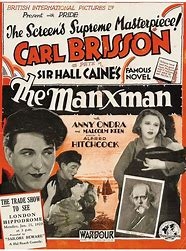 THE MANXMAN (1929) – Hitchcock’s final silent movie was this remake of a 1916 film. On the Isle of Man, poor fisherman Pete and his lifelong friend Philip, an up-and-coming lawyer, are both pursuing the pub owner’s daughter, Kate.
THE MANXMAN (1929) – Hitchcock’s final silent movie was this remake of a 1916 film. On the Isle of Man, poor fisherman Pete and his lifelong friend Philip, an up-and-coming lawyer, are both pursuing the pub owner’s daughter, Kate.
She prefers Pete, and accepts his marriage proposal, but her father Caesar refuses to consent, since Pete doesn’t have much money. Pete heads for abroad to make his fortune, and asks his old pal Philip to keep an eye on Kate, who has promised to wait for Pete’s return.
Kate and Philip have an affair and she gets pregnant with Philip’s child. Pete returns rich, and he marries Kate in time to make it look like the baby could be his. After many soap opera twists and turns, Kate and Philip admit to their affair, Philip steps down from his position as a Deemsman (Manx high magistrate), and Kate makes her choice between the two men.
*** Thankfully for cinema history, Hitchcock’s big success with The Lodger spared him – and us – from a career making routine comedies and sappy romances. Alfred’s next movie was Blackmail, and his career continued down the right path for him.
FOR A SIMILAR LOOK AT DOUGLAS FAIRBANKS’ SILENT SWASHBUCKLER MOVIES CLICK HERE.
FOR STARLET THEDA BARA’S SILENT FILMS CLICK HERE.
FOR HARRY HOUDINI’S FOUR SILENT FILMS AND ONE SILENT SERIAL CLICK HERE.
FOR TWENTY-FOUR CLASSIC SILENT HORROR FILMS CLICK HERE.

Some pretty good stuff from the mind and talent of this man. Grand review.
Thank you very much! A lot of people don’t know he did some silent films so I figured I would throw in this post.
Yeah, I didn’t know that!
I’m always glad to spread the word!
Great reviews of Alfred Hitchcock’s silent movies. I’m a huge fan of Hitchcock but had no idea he also made silent films. He truly was a one-of-a-kind filmmaker that could do practically anything in the world. Hitchcock made many great movies throughout his career, but I particularly adored “Rebecca”. An amazing gothic romance with a gripping atmosphere. It was made during the same time as his silent films. Set a high standard that remakes simply couldn’t live up to.
Here’s why it’s a must-see:
“Rebecca” (1940) – Movie Review – The Film Buff (huilahimovie.reviews)